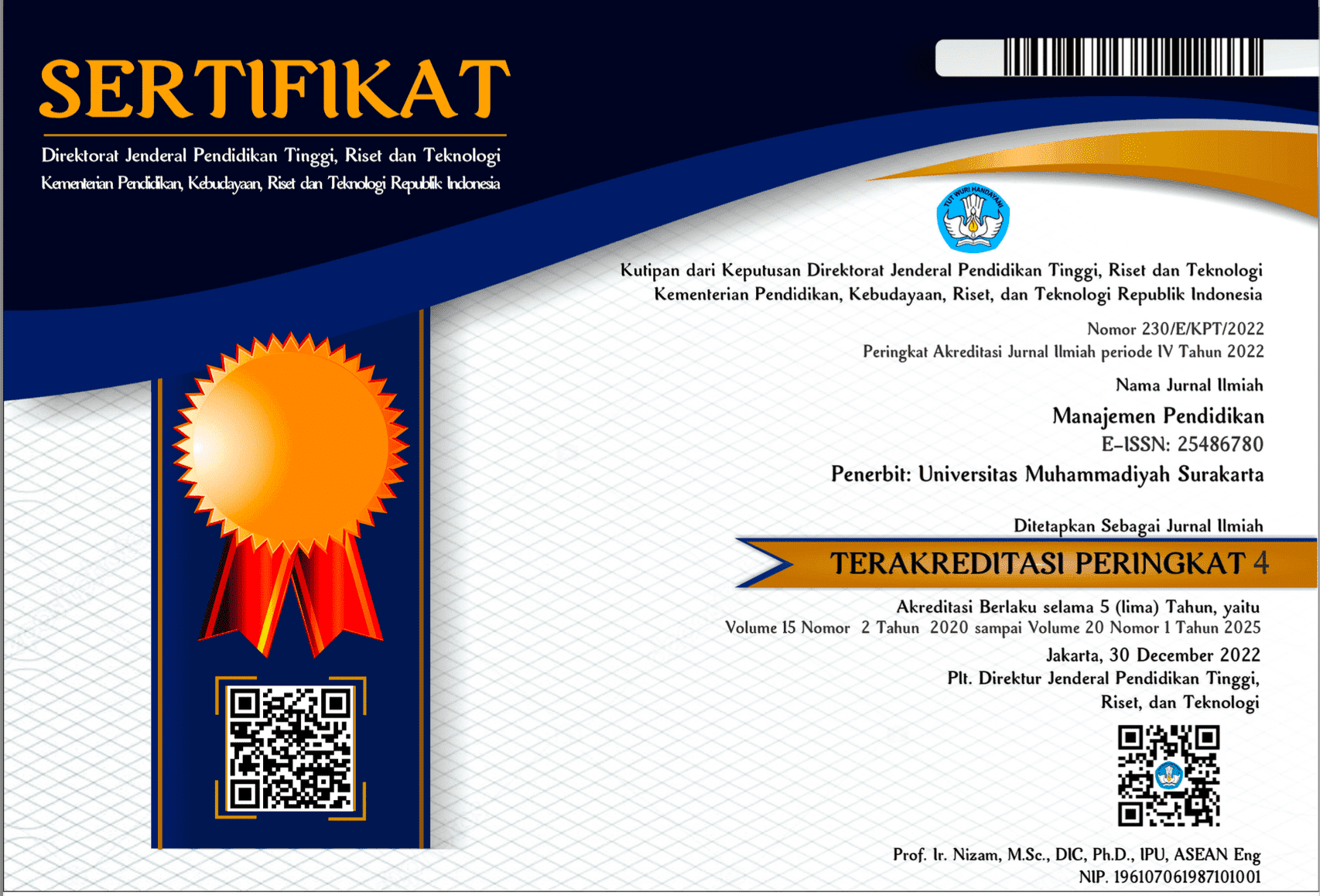Kontibusi Kemandirian Siswa, Monitoring Orang Tua dan Fasilitas Kelas Terhadap Hasil Belajar Matematika
Siti Yuliana Nur Ardiyanti(1*), Meggy Novitasari(2)(1)
(2)
(*) Corresponding Author
Abstract
This study focuses on (1) examine the contribution of student independence, parental
monitoring, and class facilities on mathematics learning outcomes (2) examine
the contribution of students’ independence on mathematics learning outcomes (3)
examine the contribution of parental monitoring on mathematics learning outcomes
(4) examine the contribution of class facilities on mathematics learning outcomes.
This research belongs to quantitative research. The study population is 350
students of class XI SMK Negeri 1 Miri Sragen. The study sample of 187 students is
determined by the Slovin formula. The data are obtained using proportional random
sampling, questionnaire, and documentation. The data find in this research are
analyzed using multiple linier regression. The results of this study are (1) there is a
contribution of student independence, parental monitoring and classroom facilities
towards mathematics learning outcomes by 16.8% while the remaining 83.2% can be influenced by other factors outside this research (2) there is no contribution of students’ independence to mathematics learning outcomes with a relative contribution of 26% and an effective contribution of 4% (3) there is parental monitoring contribution to mathematics learning result with relative contribution of 18% and effective contribution 3% (4) there is a class facility contribution to mathematics learning outcomes with a relative contribution of 256% and an effective contribution of 9%.
Keywords
Full Text:
PDFReferences
Azwar, Saifuddin. 2007. Metode Penelitian. Pustaka Pelajar: Yogyakarta
Drost. (1995). Menjadi Pribadi Dewasa dan Mandiri. Yogyakarta: Kanisius
Hapsari, S. A. dan Sutama. (2015). Kontribusi Kemandirian terhadap Hasil Belajar Matematika Ditinjau dari Fasilitas Belajar dan Jarak Tempat Tinggal Siswa SMK. Jurnal Matematika. 158-165.
Ekundayo, H.T. 2013. “School Facilities As Correlates Of Students Achievement in The Affective and Psychomotor Domain of Learning”.Europan Scientific Journal 8(6): 208-215
Kurniawan, Didik dan Dhoriva U. W. (2014). Pengaruh Perhatian Orang Tua, Motivasi Belajar, dan Lingkungan Sosial terhadap Prestasi Belaja Matematika Siswa SMP. Jurnal Riset Pendidikan Matematika, 1(2), 176187.
Muhammad, Hafid W., et al. 2013. “Parental Involvement and Academic Achievement; A Study on Secondary School Students of Lahore, Pakistan.”International Journal of Humanities and Social Sciencei, 3(8).
Muyiwa, Adeyemi. 2012. “Influence of Universal Basic Education (UBE) Facilities on School Learning Environment in Lagos State, Nigeria”.Journal of Education and Practice. Vol. 3. No.2. Page 30-39. 2012.
Ningsih, R., & Arfatin N. (2016). Pengaruh Kemandirian Belajar dan Perhatian Orang Tua terhadap Prestasi Belajar Matematika. Jurnal Formatif, 6(1), 7384.
Prianto, H. (2013). Peningkatan Hasil Belajar Matematika Melalui Pendekatan Matematika Realistic (PMR) Siswa Kelas II-A MI Alhikam Geger Madiun Tahun Pelajaran 2012/2013. Jurnal Ilmiah Pendidikan.
Raj, Tirtha Parajuli. Prof. Dr. 2005. A Research Report Parental Support And Students Learning(Final), Department of Education Sanothimi. Centre for Educational Research and Social Development. khatmandu, Nepal.
Rusmiyati, F., 2017. Pengaruh kemandirian dan kebiasaan belajar terhadap prestasi belajar matematika siswa kelas X SMA NEGERI 1 RONGKOP. Jurnal pendidikan matematika, vol. 5, no. 1, Yogyakarta.
Suwardi, Dana Ratifi.2012.”Faktor – faktor yang Mempengaruhi Hasil Belajar Siswa Kompetensi Dasar Ayat Jurnal Penyesuaian Mata Pelajaran Akuntansi Kelas XI IPS di SMA Negeri 1 Bae Kudus.”Ekonomic Education Analysis Journal1(2):1-7.
Article Metrics
Abstract view(s): 357 time(s)PDF: 336 time(s)
Refbacks
- There are currently no refbacks.










